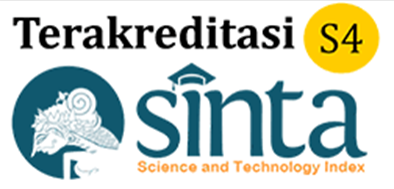Peran Transformational Leadership untuk Meningkatkan Innovative Work Behavior Menuju Bantul Smart City
Abstract
This research aims to analyze the role of regional leaders in the Bantul District Government in promoting innovative work behavior of civil servants in the Lapor Bantul program in order to optimize Bantul Smart City. This study departs from the phenomenon of efforts to improve services carried out by the Bantul District Government to foster innovative behaviors. In uncovering these phenomena, this research will analyze to what extent and how the role and actions taken by regional leaders in the Bantul District related to the Lapor Bantul program in mobilizing employees and other stakeholders so that they can contribute to and participate in the development of Bantul District together. Lapor Bantul was chosen as the focus of the research because it is a priority program indicator for the realization of Bantul Smart City. There still needs to be efforts for resident engagement and better integration among various stakeholders so that the dimension of smart society can be realized optimally. Based on purposive sampling technique, 3 informants were determined for the research, namely the Secretary of the Bantul District, the Head of the Lapor Bantul Department, and the Head of DISKOMINFO, considering their experience in policy making and program implementation for a minimum of 3 years. Data collection techniques used observation, documentation, and in-depth interviews with qualitative data analysis methods including data reduction, data display, and the conclusion.
References
Afsar, B., Cheema, S., & Bin Saeed, B. (2018). Do nurses display innovative work behavior when their values match with hospitals’ values? European Journal of Innovation Management, 21(1). https://doi.org/10.1108/EJIM-01-2017-0007
Afsar, B., Masood, M., & Umrani, W. A. (2019). The role of job crafting and knowledge sharing on the effect of transformational leadership on innovative work behavior. Personnel Review, 48(5). https://doi.org/10.1108/PR-04-2018-0133
Appio, F. P., Lima, M., & Paroutis, S. (2019). Understanding Smart Cities: Innovation ecosystems, technological advancements, and societal challenges. Technological Forecasting and Social Change, 142. https://doi.org/10.1016/j.techfore.2018.12.018
Asurakkody, T. A., & Shin, S. Y. (2018). Innovative Behavior in Nursing Context: A Concept Analysis. In Asian Nursing Research (Vol. 12, Issue 4). https://doi.org/10.1016/j.anr.2018.11.003
Baafi, F., Ansong, A., Dogbey, K. E., & Owusu, N. O. (2021). Leadership and innovative work behaviour within Ghanaian metropolitan assemblies: mediating role of resource supply. International Journal of Public Sector Management, 34(7). https://doi.org/10.1108/IJPSM-01-2021-0005
Bak, H. U., Jin, M. H., & McDonald, B. D. (2022). Unpacking the Transformational Leadership-Innovative Work Behavior Relationship: The Mediating Role of Psychological Capital. Public Performance and Management Review, 45(1). https://doi.org/10.1080/15309576.2021.1939737
Ben Yahia, N., Eljaoued, W., Bellamine Ben Saoud, N., & Colomo-Palacios, R. (2021). Towards sustainable collaborative networks for smart cities co-governance. International Journal of Information Management, 56. https://doi.org/10.1016/j.ijinfomgt.2019.11.005
Bibri, S. E., & Krogstie, J. (2017). Smart sustainable cities of the future: An extensive interdisciplinary literature review. In Sustainable Cities and Society (Vol. 31). https://doi.org/10.1016/j.scs.2017.02.016
Choi, S. B., Kim, K., Ullah, S. M. E., & Kang, S. W. (2016). How transformational leadership facilitates innovative behavior of Korean workers: Examining mediating and moderating processes. Personnel Review, 45(3). https://doi.org/10.1108/PR-03-2014-0058
Demircioglu, M. A., Hameduddin, T., & Knox, C. (2023). Innovative work behaviors and networking across government. International Review of Administrative Sciences, 89(1). https://doi.org/10.1177/00208523211017654
Dokumen Laporan Review Masterplan Smart City Kabupaten Bantul.2020.
Dokumen Master Plan Smart City Kabupaten Bantul
Günzel-Jensen, F., Hansen, J. R., Jakobsen, M. L. F., & Wulff, J. (2018). A Two-Pronged Approach? Combined Leadership Styles and Innovative Behavior. International Journal of Public Administration, 41(12). https://doi.org/10.1080/01900692.2017.1303711
Hansen, J. A., & Pihl-Thingvad, S. (2019). Managing employee innovative behaviour through transformational and transactional leadership styles. Public Management Review, 21(6). https://doi.org/10.1080/14719037.2018.1544272
Hermawan, I. (2019). Metodologi Penelitian Pendidikan ( Kualitatif, Kuantitatif dan Mixed Method ) - IWAN HERMAWAN, S.Ag.,M.Pd.I - Google Buku. In Hidayatul Quran.
Holt, S. (2018). Engaging Generation Y: The Millennial Challenge. In Management for Professionals: Vol. Part F620. https://doi.org/10.1007/978-3-319-72221-4_12
Ismagilova, E., Hughes, L., Rana, N. P., & Dwivedi, Y. K. (2022). Security, Privacy and Risks Within Smart Cities: Literature Review and Development of a Smart City Interaction Framework. Information Systems Frontiers, 24(2). https://doi.org/10.1007/s10796-020-10044-1
Khalili, A. (2016). Linking transformational leadership, creativity, innovation, and innovation-supportive climate. Management Decision, 54(9). https://doi.org/10.1108/MD-03-2016-0196
Khan, N. A., & Khan, A. N. (2019). What followers are saying about transformational leaders fostering employee innovation via organisational learning, knowledge sharing and social media use in public organisations? Government Information Quarterly, 36(4). https://doi.org/10.1016/j.giq.2019.07.003
Kim, S., & Yoon, G. (2015). An innovation-driven culture in local government: Do senior manager’s transformational leadership and the climate for creativity matter? Public Personnel Management, 44(2). https://doi.org/10.1177/0091026014568896
Kusumastuti, R. D., Nurmala, N., Rouli, J., & Herdiansyah, H. (2022). Analyzing the factors that influence the seeking and sharing of information on the smart city digital platform: Empirical evidence from Indonesia. Technology in Society, 68. https://doi.org/10.1016/j.techsoc.2022.101876
Miles, M. B. and A. M. H. (2014). Qualitative Data Analysis, A Methods Sourcebook, Edition 3. USA: Sage Publications. Terjemahan Tjetjep Rohindi Rohidi, UI-Press. Qualitative Data Analysis, A Methods Sourcebook, Edition 3. USA: Sage Publications. Terjemahan Tjetjep Rohindi Rohidi, UI-Press.
Niesen, W., Van Hootegem, A., Elst, T. Vander, Battistelli, A., & De Witte, H. (2017). Job insecurity and innovative work behaviour: A psychological contract perspective. In Psychologica Belgica (Vol. 57, Issue 4). https://doi.org/10.5334/pb.381
Overstreet, R. E., Hanna, J. B., Byrd, T. A., Cegielski, C. G., & Hazen, B. T. (2013). Leadership style and organizational innovativeness drive motor carriers toward sustained performance. International Journal of Logistics Management, 24(2). https://doi.org/10.1108/IJLM-12-2012-0141
Purc, E., & Lagun, M. (2019). Personal values and innovative behavior of employees. Frontiers in Psychology, 10(APR). https://doi.org/10.3389/fpsyg.2019.00865
Rahmi, S. (2014). Kepemimpinan Transformasional Dan Budaya Organisasi. Mitra Wacana Media.
Sethibe, T., & Steyn, R. (2017). The impact of leadership styles and the components of leadership styles on innovative behaviour. International Journal of Innovation Management, 21(2). https://doi.org/10.1142/S1363919617500153
Sharif, R. Al, & Pokharel, S. (2022). Smart City Dimensions and Associated Risks: Review of literature. In Sustainable Cities and Society (Vol. 77). https://doi.org/10.1016/j.scs.2021.103542
Sudibjo, N., & Prameswari, R. K. (2021). The effects of knowledge sharing and person–organization fit on the relationship between transformational leadership on innovative work behavior. Heliyon, 7(6). https://doi.org/10.1016/j.heliyon.2021.e07334
Sugiyono. (2017). Metode Penelitian Kuantitatif, Kualitatif, dan R&D. CV. Alfabeta.
Tan, A. B. C., Van Dun, D. H., & Wilderom, C. P. M. (2021). Innovative work behavior in Singapore evoked by transformational leaders through innovation support and readiness. Creativity and Innovation Management, 30(4). https://doi.org/10.1111/caim.12462
Widiastuti, I., & Suryawati, N. (2021). Implementation of Smart City Development Policy in Bandung City, Indonesia. IJEBD (International Journal of Entrepreneurship and Business Development), 4(1). https://doi.org/10.29138/ijebd.v4i1.1271
Yu, W., & Xu, C. (2018). Developing Smart Cities in China: An Empirical Analysis. In International Journal of Public Administration in the Digital Age (IJPADA) (Vol. 5, Issue 3).
Zubizarreta, I., Seravalli, A., & Arrizabalaga, S. (2016). Smart City Concept: What It Is and What It Should Be. Journal of Urban Planning and Development, 142(1). https://doi.org/10.1061/(asce)up.1943-5444.0000282
Copyright (c) 2024 Jurnal Manajemen dan Ilmu Administrasi Publik (JMIAP)

This work is licensed under a Creative Commons Attribution 4.0 International License.













